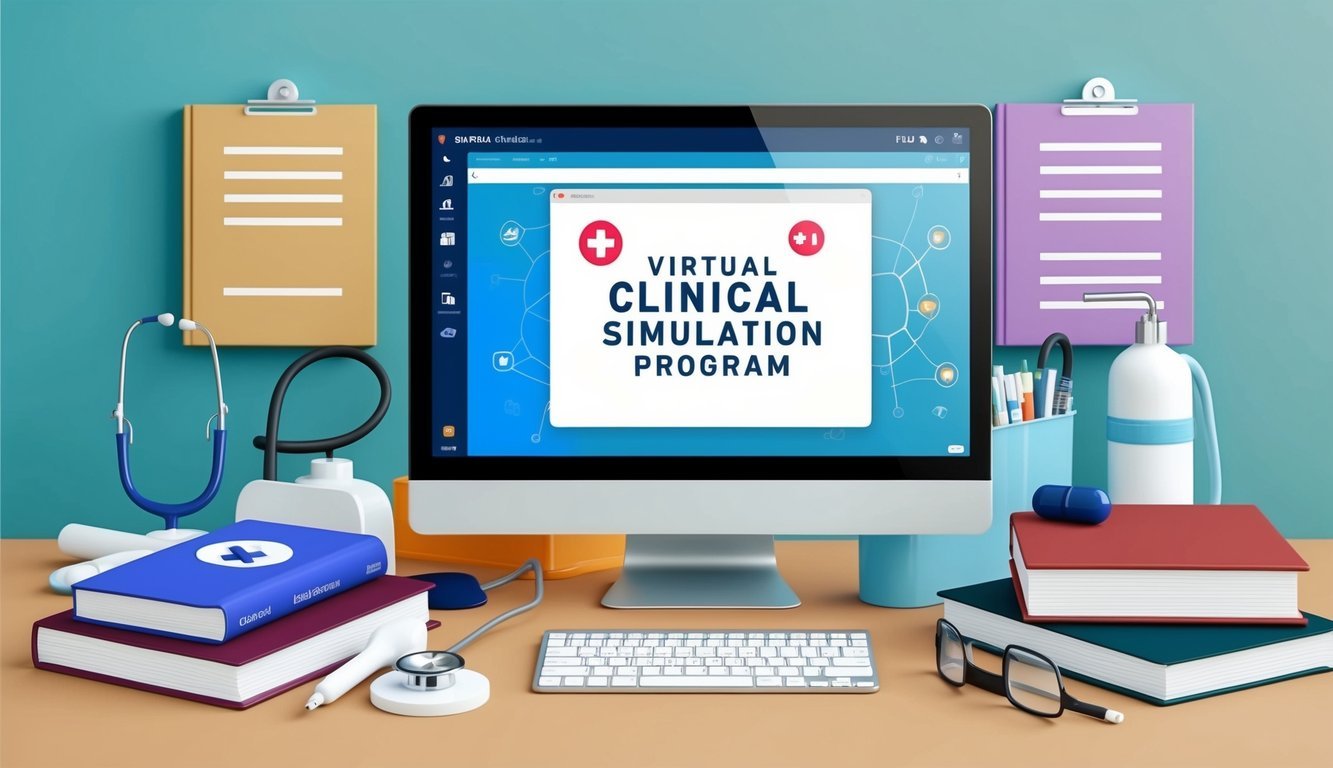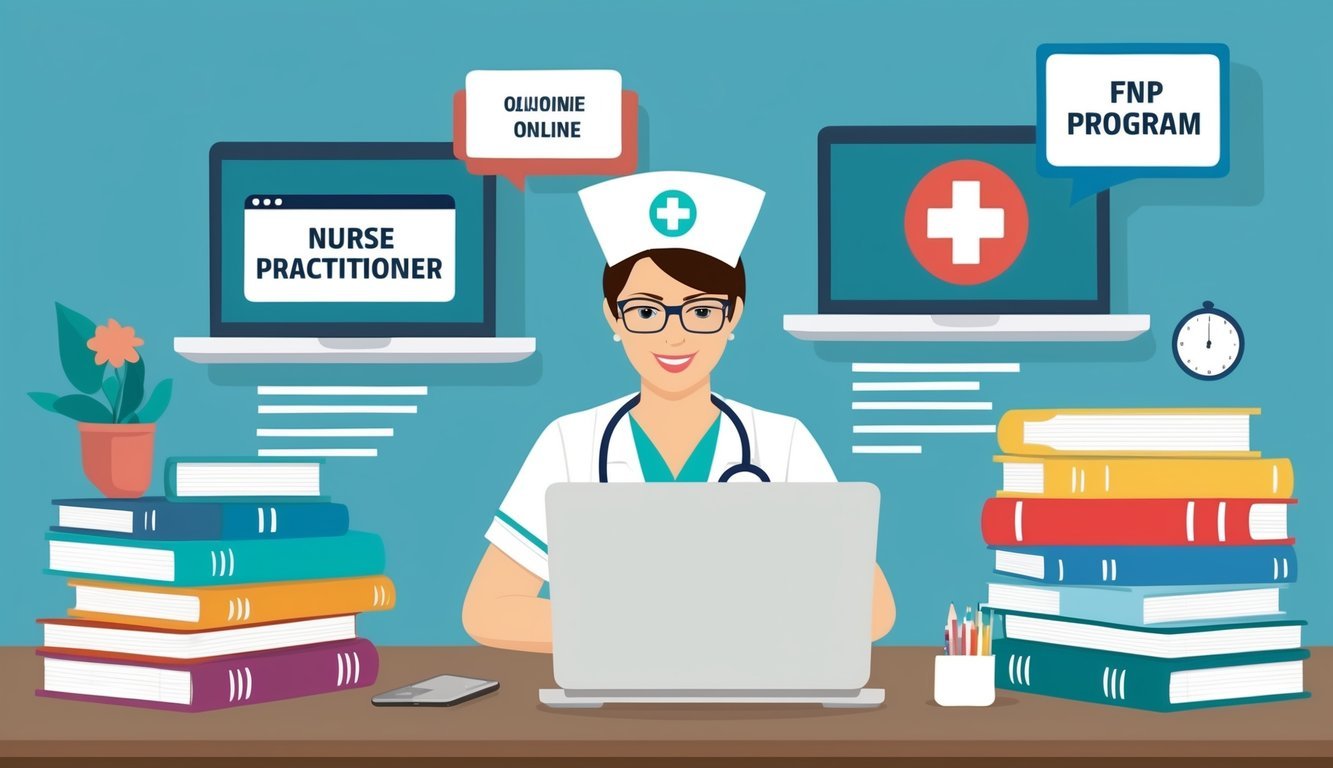Embarking on a career as a Family Nurse Practitioner (FNP) can be an exciting and fulfilling journey.
If you’re looking to achieve this goal quickly, a 12-month FNP program online may be the perfect fit for you. This accelerated program allows you to gain essential knowledge and skills in advanced practice nursing while balancing your existing commitments.
Many reputable institutions offer online FNP programs designed to prepare you for certification and a successful career in primary care.
These programs feature a mix of coursework and clinical practice, ensuring you develop the necessary competencies to address a wide range of patient needs.
Enrolling in an online program provides the flexibility to study at your convenience, making it easier to juggle work and personal responsibilities.
As you consider your options, it’s important to compare various online programs based on factors like accreditation, curriculum, and admission requirements.
With a well-structured online FNP program, you can position yourself for a rewarding role in healthcare, helping families achieve better health outcomes.
Explore resources to find the best 12-month FNP program online that suits your ambitions.
Understanding FNP Education

Embarking on a Family Nurse Practitioner (FNP) program requires a solid grasp of nursing education pathways, essential curriculum components, and how advanced nursing theory integrates with practice.
This knowledge equips you to succeed in delivering comprehensive patient care.
Path from BSN to MSN-FNP
The typical pathway to becoming an FNP begins with earning a Bachelor of Science in Nursing (BSN).
Following this, you can pursue a Master of Science in Nursing (MSN) with a focus on Family Nurse Practitioner (FNP) specialization.
- BSN: Prepares you with foundations in nursing practice and patient care.
- MSN-FNP Program: Builds on your BSN, emphasizing advanced practice skills.
You will also take courses in advanced pharmacology and pathophysiology, crucial for diagnosing and treating patients.
Key Components of FNP Curriculum
The FNP curriculum is designed to prepare you for advanced clinical roles.
Key components include:
- Advanced Pharmacology: Essential knowledge for prescribing medications safely and effectively.
- Pathophysiology: Understanding disease processes to inform patient care strategies.
- Health Promotion: Focus on preventive care and health education for diverse populations.
Evidence-based practice is also a critical aspect, ensuring that your clinical decisions are informed by the best available research.
This holistic approach equips you to address various patient needs.
Advancing Nursing Theory and Research
A strong emphasis on nursing theory and research underpins the curriculum.
You will engage with various theoretical frameworks that inform clinical practice.
This includes:
- Nursing Theories: Guiding principles that shape patient interaction and care strategies.
- Research Methods: Skills to critically analyze studies, enabling informed clinical decisions.
Participating in research projects enhances your understanding of evidence-based practices, integrating acute care and preventive strategies into your nursing practice.
Engaging in this advanced education ultimately prepares you for effective, patient-centered care as an FNP.
Online FNP Program Structure

Online Family Nurse Practitioner (FNP) programs are designed to combine flexibility with comprehensive learning.
You’ll engage with various formats and clinical experiences essential for your development.
The structure typically includes online classes, practical clinical hours, and specific admission requirements.
Learning Formats and Flexibility
Most online FNP programs offer a combination of synchronous and asynchronous learning.
This allows you to attend live classes while also accessing recorded lectures at your convenience.
Programs may require weekly assignments and discussions to encourage engagement.
Flexibility is a key feature.
Many institutions offer part-time options, enabling you to balance studies with work or personal commitments.
You can expect to complete most coursework online, with the occasional on-campus requirement for intensive workshops or simulations.
This structure accommodates diverse learning styles and schedules.
Clinical Experience and Hours
Clinical experience is crucial in FNP programs.
Typically, you will need to complete between 500 to 1,000 clinical hours, depending on the program.
These hours provide hands-on training under the supervision of experienced practitioners, allowing you to apply your theoretical knowledge in real-world settings.
Many programs assist you in finding clinical placements or may have established partnerships with healthcare facilities.
The clinical experience usually involves a variety of settings, such as primary care, pediatrics, or geriatrics, exposing you to diverse patient populations.
This breadth of experience is essential for developing well-rounded competencies.
Admission Requirements
Admission to online FNP programs typically requires a Bachelor of Science in Nursing (BSN) and an active Registered Nurse (RN) license.
You may also need to submit a personal statement, letters of recommendation, and your resume, demonstrating your clinical experience and academic background.
Some programs may require standardized test scores, such as the GRE, though many have waived this requirement.
Ensure you review the specific requirements for each accredited program, as they can vary significantly.
Being prepared with the necessary documentation can streamline your application process, enhancing your chances of acceptance.
Licensing and Certification

Obtaining the necessary licensing and certification is crucial for your career as a Family Nurse Practitioner (FNP).
This involves preparing for certification exams and understanding state-level Advanced Practice Registered Nurse (APRN) licensure.
Preparing for FNP Certification
To become certified as an FNP, you typically need to pass one of two primary exams: the AANP (American Association of Nurse Practitioners) or the ANCC (American Nurses Credentialing Center).
These certifications validate your ability to provide advanced care.
Before taking the exam, review the following essential steps:
-
Eligibility Requirements: Confirm that you have completed an accredited FNP program and possess a valid RN license.
-
Study Resources: Utilize test preparation materials like review books, online courses, or practice exams. Some helpful resources include AANP Study Guide and ANCC Certification Resources.
-
Application Process: Complete the application and pay the exam fee through the respective certifying organization’s website.
-
Continuing Education: Stay informed about continuing education requirements for maintaining your certification.
Navigating APRN Licensure
After obtaining your FNP certification, the next step is securing state licensure as an APRN.
Each state has unique licensing requirements.
Key aspects to consider include:
-
State Regulations: Familiarize yourself with your state’s specific rules regarding APRN practice and prescriptive authority.
-
Application Process: Submit your application along with proof of your certification, RN license, and any required fees.
-
Documentation: Be prepared to provide transcripts, verification of clinical hours, and background checks as part of your application.
-
Renewal and Maintenance: Keep track of your license renewal dates and comply with continuing education requirements specific to your state.
For more details on state-specific licensing information, check resources like the NCSBN APRN Map.
Clinical Practicum and Simulation

In a 12-month Family Nurse Practitioner (FNP) program, clinical practicum and simulation are essential components that enhance your training.
These elements provide hands-on experience in real-world settings, ensuring that you develop the skills necessary for effective patient care while emphasizing quality improvement and patient safety.
Integration of Clinical Studies
During your clinical rotations, you will engage in diverse healthcare settings that allow you to apply theoretical knowledge to practice.
These rotations typically include primary care offices, community health centers, and specialty clinics, enabling you to work closely with patients under the supervision of experienced preceptors.
You will be responsible for patient assessments, developing care plans, and implementing treatments.
Simulation labs are integrated into the curriculum to help you practice clinical skills in a controlled environment, where you can enhance your competencies without risk to patients.
This combination of clinical practice and simulated experiences ensures you are well-prepared for real-life scenarios.
Quality Improvement and Patient Safety
Quality improvement initiatives are a vital focus during your practicum.
By participating in projects aimed at enhancing patient outcomes, you gain insight into effective healthcare delivery models.
Understanding how to measure and evaluate outcomes is crucial for your future role as a practitioner.
Patient safety is paramount.
Your training will include protocols for identifying and mitigating risks, and applying evidence-based practices in your care approach.
You will be taught to recognize signs of potential complications and work collaboratively with healthcare teams to ensure a safe healthcare environment.
Emphasizing both quality improvement and patient safety prepares you to excel in your FNP role.
Career Pathways in Family Nurse Practitioner Roles

Family Nurse Practitioners (FNPs) have diverse career pathways that combine clinical practice with leadership and educational opportunities.
You can find many roles in primary care, healthcare policy, and nursing leadership.
These avenues allow you to enhance patient care while contributing to the advancement of the nursing profession.
Scope of Practice in Primary Care
As an FNP, your primary role is to provide comprehensive care to patients across various age groups, focusing on health promotion, disease prevention, and chronic disease management.
Your scope of practice typically includes diagnosing and treating common illnesses, performing physical exams, and prescribing medications.
In a primary care setting, you collaborate with other healthcare providers, ensuring coordinated care.
You can also specialize in areas such as pediatrics, geriatrics, or psychiatric care, broadening your professional impact.
Annual salary ranges for FNPs can vary, but they often earn between $95,000 and $120,000, depending on location and experience.
This role can lead to job opportunities in clinics, hospitals, and community health organizations.
Leadership and Education Opportunities
Many FNPs transition into leadership roles, influencing healthcare policy and practices.
In administrative positions, you may oversee nursing staff, optimize clinical operations, and participate in strategic planning.
Your insights can help shape healthcare delivery models.
Education roles are another pathway.
You can teach nursing students or conduct workshops for practicing nurses, sharing your expertise.
Engaging in nursing leadership also means advocating for improved patient care and influencing healthcare policies at local and national levels.
You can find openings in academia, hospitals, and professional organizations that focus on advancing nursing practices.
Pursuing additional certifications or advanced degrees, like a Doctor of Nursing Practice (DNP), can further enhance your qualifications and career prospects.

